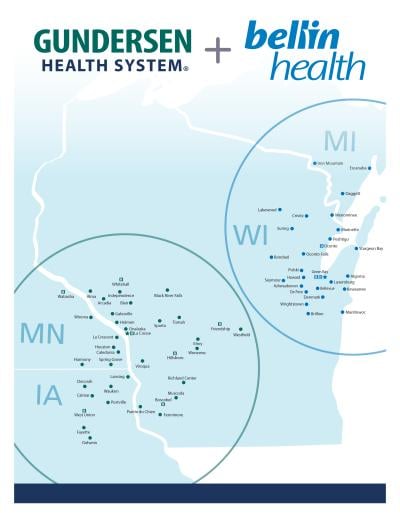Bellin Health and Gundersen Health System “anticipate” the close of a previously announced “merger of equals” by the end of the month, according to an announcement from the Wisconsin nonprofits.
Coming together will create an 11-hospital system with more than 100 clinic locations across Wisconsin, Upper Michigan, southeastern Minnesota and northeast Iowa. The organization will employ more than 14,000 people and have more than $2.4 billion in annual revenues.
“Our health systems have been successfully fulfilling our individual missions, but we know we will thrive and best serve our patients and communities by finding partners with shared missions and strategic visions,” Scott Rathgaber, M.D., current Gundersen CEO and incoming CEO of the combined organizations, said in the announcement. “This merger brings transformative opportunities to expand our patient-centered care and community-minded work. Together, we can invest resources wisely and efficiently to improve health and well-being in our communities, especially for marginalized individuals and broadly for everyone in our care.”
Green Bay-based Bellin and La Crosse-based Gundersen have no overlap in service areas. As such, the systems said much of their current structure and presence will be the same as they plan to maintain the dual headquarters and have a "balanced leadership structure that places each of the two top positions—CEO and board chair—in different regions to ensure shared decision-making and equal representation.” Branding across the locations will remain in place across each region’s locations.
The organizations also told the Green Bay Press Gazette that there will be no layoffs as a result of the merger, though certain administrative and technology departments will be consolidated.

“The people you know and the care and locations you trust are not changing,” Chris Woleske, current Bellin CEO and soon-to-be system executive vice president and regional president, said in a statement assuring no disruptions in care. “Coming together will allow Bellin and Gundersen to better serve our patients and communities, preserving and enhancing a legacy of local, personalized care that will endure for decades to come.”
Other leadership appointments for the joint system include current Bellin Board Chair John Dykema as the chair of the new organization, and current Gundersen Chief Nursing Officer and Chief Operating Officer Heather Schimmers as the regional president for the system’s Gundersen region.
Bellin and Gundersen pulled back the curtain on their late-stage merger discussions back in June. Their messaging then and in the time since has highlighted an increase in care resources and network options; new population health advancements; and a continued focus on health equity, preventive health and behavioral health.
The systems also highlighted their nonprofit statuses and plans to continue reinvesting the more than $120 million made each year back into their communities and patient care.
“We invest dollars to improve health outcomes, specifically for marginalized individuals and broadly for everyone in our care,” Rathgaber said in the June announcement. “Through this model, we also work hard to lower or maintain premiums on health plans, which reduces costs for the employers and businesses we serve.”
Bellin Health today comprises over 5,000 employees, four hospitals, 29 primary and specialty care physician clinics and its FastCare retail clinics. The system also belongs to Bellin Health Partners, a clinically integrated network that includes its employed and independent affiliated providers as well as Holy Family Memorial.
Gundersen Health System is the larger of the two organizations with seven hospitals, more than 60 clinics and over 9,000 employees, 1,000 of which are employed clinicians. The organization says it sees “well over 1 million” patient visits annually.
Belling and Gundersen aren’t the only Midwest systems making merger headlines. Last week saw fellow Wisconsin-based nonprofit Fairview Health Services announce plans to hitch its wagon to South Dakota-based Sanford Health, potentially yielding a 58-hospital behemoth beginning in 2023.